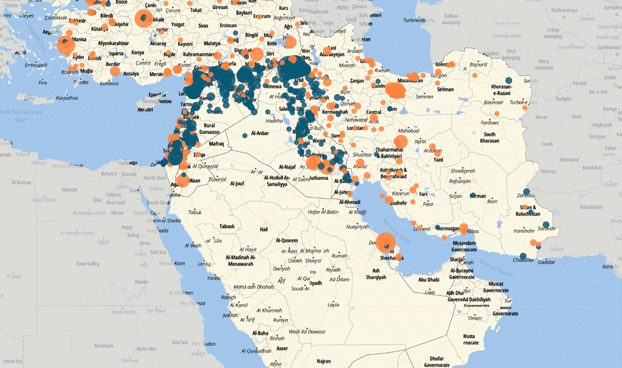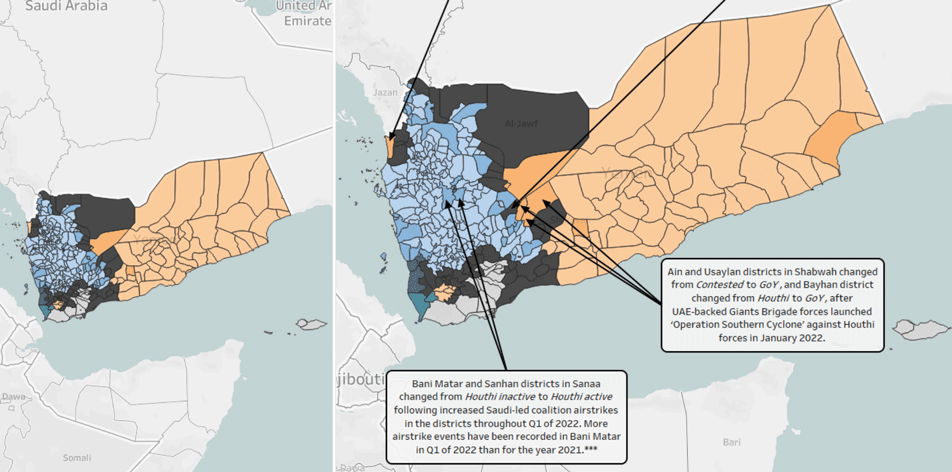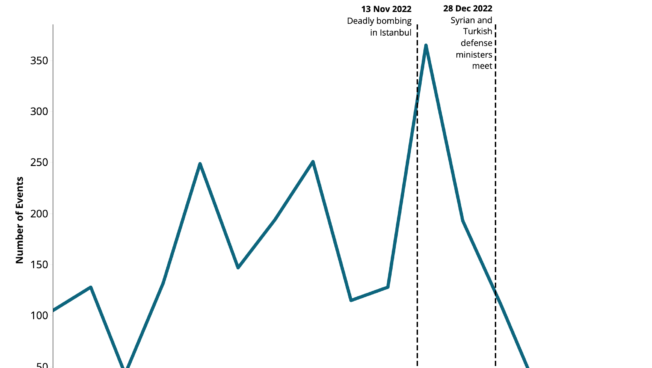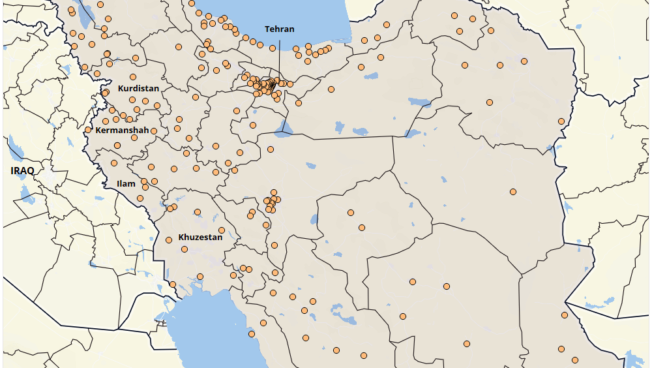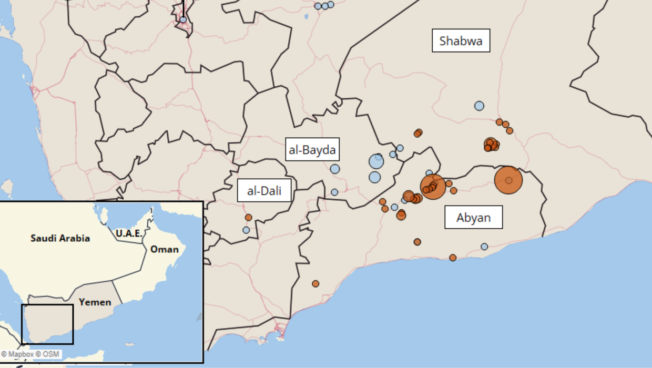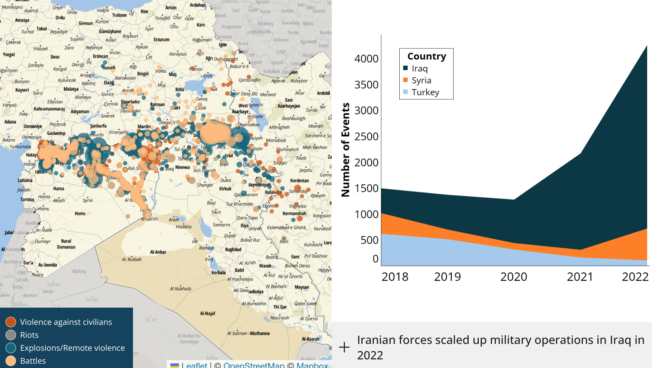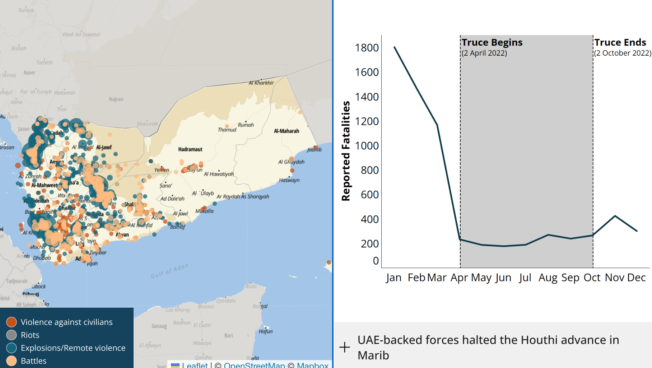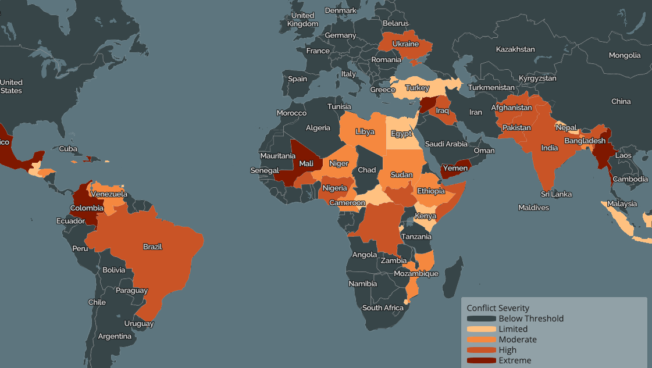Regional Hub:
Region at a Glance
Week of 22 Apr 23*
Data cover the period of 22 Apr 23 - 28 Apr 23. For more information about how ACLED collects data and categorizes events, see the ACLED Codebook.
ACLED data updates are paused for the second and third weeks of May 2023.
Political Violence Events: 322ℹ
-30% from previous week
Demonstration Events: 197ℹ
+9% from previous week
Event Types:
Battles: 81 Events
Explosions/Remote Violence: 122 Events
Violence Against Civilians: 69 Events
Mob Violence: 50 Events
Protests: 185 Events
Violent Demonstrations: 12 Events
Find all ACLED data and analysis for the Middle East below.
The Middle East dataset is updated every Monday through the most recent Friday.
Spotlight Countries:
Curated Data
This file contains all political violence events, demonstration events, and strategic developments recorded in the Middle East from the beginning of ACLED coverage to the present. Please note that historical coverage may vary by country. A full list of country-year coverage is available here.
For an explanation of how ACLED codes and categorizes data, see the ACLED Codebook. For more information, see our Resource Library. Guides specific to the Middle East include:
Regional Overviews
Our monthly analysis briefs break down the latest data on political violence and protest trends, highlighting potential early warning signs for closer monitoring.
Regional Data Collection Partners
ACLED partners with a wide range of organizations to collect information in hard-to-access contexts and integrate thematic, regional, and country-level expertise into our data collection program.
Click through the list to learn more about our partners in the Middle East.
ACAPS is an independent information provider that is free from the bias or vested interests of any specific enterprise, sector, or region. As independent specialists in humanitarian needs analysis and assessment, ACAPS are not affiliated with the UN or any other organization. This helps guarantee that our analysis is objective and evidence-based.
ACAPS was established in 2009 as a nonprofit, nongovernmental project with the aim of conducting independent, groundbreaking humanitarian analysis to help humanitarian workers, influencers, fundraisers, and donors make better-informed decisions.
The project is overseen by a consortium of three NGOs: the Norwegian Refugee Council (NRC), Save the Children, and Mercy Corps.
The Aid Worker Security Database (AWSD) records major incidents of violence against aid workers. Initiated in 2005, to date the AWSD remains the sole comprehensive global source of this data, providing the evidence base for analysis of the changing security environment for civilian aid operations. The AWSD is a project of Humanitarian Outcomes.
Airwars is a collaborative, not-for-profit transparency project aimed at tracking, assessing and archiving international military actions and related civilian harm claims in conflict zones such as Iraq, Syria, and Libya. Founded in 2014, Airwars has established itself as a leading authority on conflict violence as it affects civilian communities.
Americans for Democracy & Human Rights in Bahrain (ADHRB) fosters awareness of and support for democracy and human rights in Bahrain and Gulf Cooperation Council countries (GCC).
The Carter Center has helped to improve life for people in over 80 countries by resolving conflicts; advancing democracy, human rights, and economic opportunity; preventing diseases; and improving mental health care. The Support for Peace in Syria Initiative proceeds along two interrelated lines: conflict transformation dialogue and using conflict research, analysis, and documentation based on open source information to support peacebuilders. The Center’s advantages and long-standing promotion of realistic policy goals in Syria make it well-placed to meet current peacebuilding needs for purposes of reforms, the peaceful reintegration of the country, economic recovery, reconstruction, and refugee return.
Christian Peacemaker Teams – Iraqi Kurdistan (CPT-IK) builds partnerships to transform violence and oppression in situations of lethal conflict. To help protect human rights and strengthen nonviolent social change initiatives, CPT-IK provides unarmed protective accompaniment, human rights reporting, advocacy and solidarity networking.
Front Line Defenders is an Irish-based international organisation, founded in 2001, with the specific aim of protecting human rights defenders at risk (HRDs); people who work, non-violently, for any or all of the rights enshrined in the Universal Declaration of Human Rights. Front Line Defenders addresses the protection needs identified by HRDs themselves. The organisation has special consultative status with the Economic and Social Council of the United Nations (ECOSOC) and in 2018 Front Line Defenders was awarded the UN Prize in the Field of Human Rights.
Kurdistan Human Rights Network (KHRN) is a France-based independent, non-profit, and non-partisan organization promoting human rights and documentation of violations in Iran’s Kurdish region.
ProtectDefenders.eu is the European Union Human Rights Defenders mechanism, established to protect defenders at high risk and facing the most difficult situations worldwide. ProtectDefenders.eu is committed to reaching Human Rights Defenders working in remote areas and countries where it is particularly dangerous to work in human rights defense. It focuses on defenders who are especially targeted, including women human rights defenders, defenders of LGBTI rights, land and environmental rights defenders, economic and social rights defenders, defenders of minorities, lawyers, and those fighting for freedom of expression and association.
The Sana’a Center for Strategic Studies is an independent think-tank that seeks to foster change through knowledge production with a focus on Yemen and the surrounding region. The Center’s publications and programs cover political, social, economic, and security related developments, aiming to impact policy locally, regionally, and internationally. The Center maintains cordial relations with all key stakeholders, but has remained fiercely unaligned with any of the belligerent parties. The Sana’a Center has thus maintained a unique positioning and ability to work throughout Yemen and beyond, distinguishing itself as an emerging leader in Yemen-related research and analysis.
The Syrian Network for Human Rights is an independent, a non-governmental, non-profit organization, founded in June 2011, that works on documenting human rights violations in Syria, serving as a primary source for UN bodies and international organizations including OPCW, HRW, AI, and many local media outlets.
The Yemen Data Project (YDP) is an independent data collection project aimed at collecting and disseminating data on the conduct of the war in Yemen, with the purpose of increasing transparency and promoting accountability of the actors involved. In the absence of official military records from any of the parties to the conflict. YDP was founded in 2016 with the overall goal of contributing independent and neutral data to increase transparency over the conduct of the war and to inform humanitarian response, human rights advocacy, media coverage, and policy discussion.
Special Projects
ACLED special projects are designed to provide innovative tools to support conflict analysis, violence prevention initiatives, and efforts to monitor emerging crisis situations.
Yemen Truce Monitor
At the start of April 2022, the UN announced the beginning of a truce in Yemen — raising hope for an end to one of the world’s worst conflicts. To support analysis of political violence trends during the truce and allow users to track violations, ACLED launched the interactive Yemen Truce Monitor. Visit the page to use the tool and access the latest data and analysis on the truce.
ACLED Religion
ACLED-Religion was a pilot project collecting real-time data on religious repression and disorder. Building off ACLED’s core methodology, ACLED-Religion introduced new event types to capture religion-related violence and harassment while adding further information about religious dynamics and actors to existing ACLED data. The pilot project covered seven countries in the Middle East and North Africa: Bahrain, Egypt, Iran, Iraq, Israel, Palestine, and Yemen.
ACLED Religion is now archived, but data covering the period January 2020-March 2022 are available for download.
Territorial Mapping Initiatives
Mapping Territorial Control in Syria
Our quarterly Syria control map assesses conflict activity at the sub-district level across the country, classifying each area as contested, inactive, or controlled by an actor based on the latest ACLED data.
Mapping Territorial Control in Yemen
Our quarterly Yemen control map assesses conflict activity at the district level across the country, classifying each area as contested, inactive, or controlled by an actor based on the latest ACLED data.


